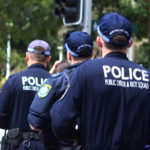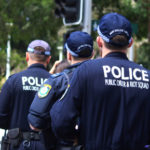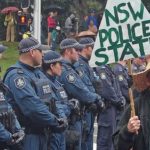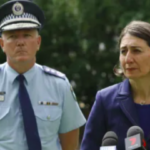COVID-19 Policing: Confusion, Wannabes and Authoritarian Creep
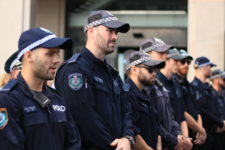
The main NSW COVID-19 public health order was amended on 14 May, so that as of the following day the ban on outdoor gatherings was lifted from more than two to more than ten, and the prohibition on being outside without a “reasonable excuse” was revoked.
However, on Saturday, the NSW police website reported that at 9.30 pm on 15 May, some NSW highway patrol officers pulled over a 19-year-old man on Mitchell’s Pass in Emu Plains and fined him $1,000 for being out without a reasonable excuse, despite the prohibition having been lifted.
When NSW Greens MLC David Shoebridge quizzed police commissioner Mick Fuller at a 20 May parliamentary hearing as to whether citizens still require a reasonable excuse to be out, the top cop declined to give an on-the-spot response, seeming somewhat perplexed himself.
Permanent fake cops
Meanwhile, south of the border, Victorian authorities have announced that they’re considering making permanent a range of enhanced protective services officer (PSO) powers that were rolled out for the COVID-19 state of emergency that was called in that state.
Despite having the appearance of police, as well as similar powers and even packing guns, PSOs aren’t cops. The main difference is their policing duties are mostly reserved to the Victorian suburban rail network and when they’re outside of their designated area, their powers don’t apply.
But, during the pandemic, PSOs were deployed more widely, including on the street in the Melbourne and Geelong CBDs and at shopping centres and on high streets. The top reasons for PSOs arresting people during the COVID crisis were for theft, shoplifting and public drunkenness.
And due to the perceived success of this venture, both Victoria police and the Andrews government would like to see PSOs deployed outside of transport hubs more permanently.
Look what the virus dragged in
While across the ditch, the Kiwis have already moved into stage 2 of the reopening of their economy. And as of 11.59 pm on 13 May, New Zealand began reopening businesses, allowing domestic travel, and bringing sports and recreation back.
In order to deal with the aftermath of the national state of emergency, the NZ parliament rushed through the COVID-19 Public Health Response Bill 2020 on 13 May.
It establishes “a fit-for-purpose legal framework for managing the unprecedented circumstances of the COVID-19 epidemic”.
The bill has raised eyebrows for a number of reasons, including the new section 11 orders that allow the health minister to issue sweeping legally enforceable orders, relating to whatever stage of the reopening they find themselves within.
But, the most controversial law contained in the bill allows police to enter a premises, including a private dwelling, “without a warrant if they have reasonable grounds to believe that people have gathered there in contravention of an order” and it’s necessary to enter to give them a direction.
Now, with laws like that being passed in the progressive land of the long white cloud, then just imagine what sort of tricks the regressive Morrison government in Canberra might have up its sleeve.


